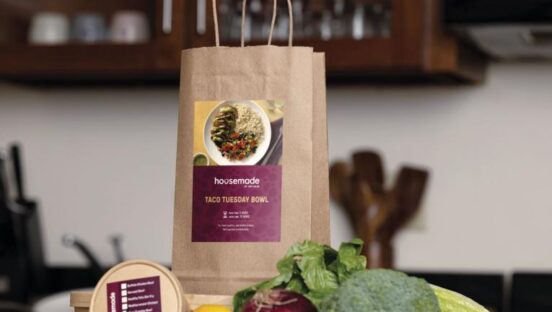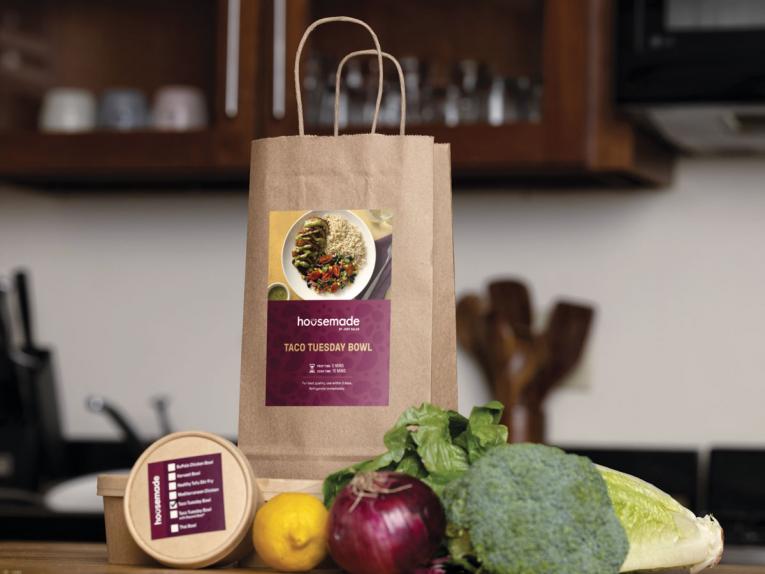“Going green” has been a focus for the restaurant industry for over a decade now, but in recent years—with the dire implications of climate change becoming more evident—the mantra has come with increased urgency. And now, with the COVID-19 pandemic reshaping our understanding of our effect on the planet—and driving us to consume far more food in takeout containers—some in the industry are reasserting themselves in sustainability efforts.
Health concept Just Salad cemented its commitment to fighting climate change when it rewrote its mission statement last year, adding a sustainability aspect to its tagline. Now the company’s mission statement is “to make everyday health and everyday sustainability possible.”
Just Salad chief sustainability officer Sandra Noonan says the company adapted the tagline to explicitly point out the brand’s focus on environmentally conscious changes.
One of those changes was to introduce a carbon labeling system late last year. The label, which measures the greenhouse gas emissions of ingredients, allows customers to see how big of a carbon footprint their favorite menu items have. The items with the lowest greenhouse gas emissions were added to a “Climatarian Menu.”
“It wasn’t so much saying, ‘Our customers are clamoring for a Climatarian Menu,’” Noonan says of the addition. “It was more saying, ‘We think our customers are ready for a Climatarian Menu and would appreciate that.’ And we’re now looking at the data to see if they’re responding to it.”
Just Salad has also focused its eco-friendly efforts in programs aimed at reducing waste. The brand has ramped up its reusable container initiative—guests can purchase a reusable bowl and get free toppings when they bring it in on future visits—by offering sanitation services. Just Salad also reduced disposable utensil consumption through its online ordering interface, which requires customers to answer whether they want utensils in the order, and it’s looking into partnering with new technologies like waste reduction apps to further reduce waste.
Shouk owner Ran Nussbacher also implemented cutlery changes in his Washington, D.C.–based Mediterranean concept, switching to biodegradable wooden utensils over the past few months. But for Nussbacher, the biggest fight for an environmentally friendly restaurant is on the menu. Shouk offers a completely plant-based menu, with food items targeted toward consumers who normally wouldn’t associate with the plant-based label.
“The reason that Shouk came to life was specifically to fight climate change. It was founded with the understanding that what’s on our plate is at the center of this existential issue we’re facing as humanity, because nothing comes close in terms of impact as our food,” Nussbacher says. “The changes that we make on our plate give us the … biggest impact on the future of this planet.”
Not all concepts can completely reconceptualize their menus for the sake of environmentalism. Nussbacher says other innovations, like biodegradable and otherwise sustainable packaging options, should become especially important adoptions in that case—particularly with so much food being consumed off-premises in the wake of the pandemic.
To further align with its sustainable values, Shouk is also in the process of finalizing a tree-planting program in conjunction with a nonprofit partner, while also switching to wind-powered energy for its two locations.
All this evolution around sustainability hasn’t necessarily been easy—or cheap. “Every product that is new and unique and requires a little bit more than the usual plastic item is going to be more expensive,” Nussbacher says. “There’s no way to [become more eco-friendly] cost-effectively. You just have to care enough to do it, because that’s part of who you are and you want to do the right thing. But I also think customers are increasingly demanding that kind of behavior from the companies they engage with.” He adds that the process to go green requires more long-term thinking than bottom line concerns.
Of course, in the midst of a pandemic and recession, thinking beyond keeping the doors open can be stressful for operators. Green Restaurant Association CEO Michael Oshman says the pandemic has made environmentally conscious changes more difficult for struggling restaurants.
The Green Restaurant Association’s network reaches more than 30,000 restaurants, with Oshman estimating that the organization works with around 700 concepts at any given time. The association gives restaurants Green Restaurant Certification depending on a number of factors that vary from water efficiency to chemical and pollution reduction. By becoming a certified eco-friendly restaurant, Oshman says, restaurants have an advantage that is more than monetary. For example, green restaurants can in turn create happier customers and employees, who would prefer to be loyal to an establishment that aligns with their values.
Oshman says appealing to eco-friendly values doesn’t necessarily have to be costly. He says all restaurants can implement methods that reduce waste, like asking if customers would like bread or straws instead of automatically providing them for the table.
Even if these changes seem small, he says any and all contributions will drive post-pandemic change. “The environmental movement cannot be vaccinated. It cannot just have two or three companies that come out with a super solution that fixes it like this pandemic,” Oshman says. “The vaccine for this movement is millions and billions of people making new choices at restaurants and becoming a certified green restaurant. The good news is, almost everybody wants that and is ready for that.”












